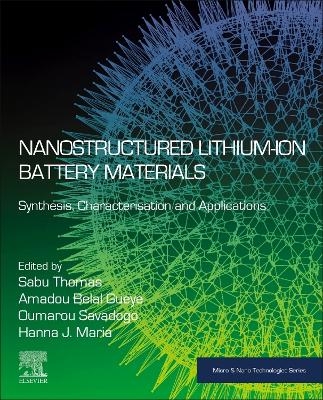
Nanostructured Lithium-ion Battery Materials
Elsevier - Health Sciences Division (Verlag)
978-0-443-13338-1 (ISBN)
Sabu Thomas is a Professor and Director of the International and Interuniversity Centre for Nanoscience and Nanotechnology, Mahatma Gandhi University, India. He is internationally recognized for his contributions to polymer science and engineering, with his research interests encompassing polymer nanocomposites, elastomers, polymer blends, interpenetrating polymer networks, polymer membranes, green composites, nanocomposites, nanomedicine, and green nanotechnology. His groundbreaking inventions in polymer nanocomposites, polymer blends, green bionanotechnology, and nano-biomedical sciences have significantly advanced the development of new materials for the automotive, space, housing, and biomedical fields. Prof. Oumarou Savadogo is Full Professor and UNESCO Chair on Sustainable Engineering and Applied Solar Technologies, at Polytechnique Montréal, Quebec, Canada. With a background in materials science, he was also previously a process engineer at Rhône-Siltec (production of silicon for photovoltaic solar cells) and a postdoctoral fellow at CNRS-Bellevue, both in France. At Polytechnique Montréal, he is Founding Director of the Laboratory of New Materials for Energy and Electrochemistry, and is responsible for the graduate programs on Renewable Energy in Energy Engineering and Energy and Sustainable Development in Chemical Engineering. Prof. Savadogo’s research interests include the development of new materials for solar energy, fuel cells, batteries, electrochemical capacitors, electrochemistry, metallurgical processes, corrosion, and microbial cells. He is author or co-author of more than 200 scientific publications in refereed scientific journals, Founding Editor of the Journal of New Materials for Electrochemical Systems, and a member of the advisory/editorial boards of the Journal of Enzyme Engineering, the Journal of Materials, Membranes, and Discover Energy. He is also member of the Broad of Directors and Advisory Board of the International Hydrogen Energy Association. Amadou Belal Gueye is a Research Scholar at the School of Chemical Sciences, Mahatma Gandhi University, Kottayam, India. He received his bachelor’s degree in physics-chemistry and his master’s degree in physical chemistry applied to energy and analysis, from Cheikh Anta Diop University, Dakar, Senegal. He works in the field of lithium/sulfur batteries. She completed her Ph.D. in 2015. Following her Ph.D., she conducted postdoctoral research at the Centre for Advanced Materials, Qatar University, Doha-Qatar, under Prof. Mariam Ali S A Al-Maadeed, where she worked on improving the adhesion between fibers and LDPE via plasma modification. She also pursued postdoctoral research with Prof. Koichi Goda in the Department of Mechanical Engineering, Yamaguchi University, Japan, in collaboration with TOCLAS Corporation, Japan. She was awarded the Dr. D. S. Kothari Postdoctoral Fellowship (DSKPDF) to work with Prof. Sabu Thomas at Mahatma Gandhi University.
Part I: Introduction to Lithium-ion Battery Systems
1. Introduction and History of Lithium-ion Batteries
2. Electrochemistry and Basic Reaction Mechanism of Lithium-ion Batteries
3. Advantages and Disadvantages of Lithium-ion Batteries
4. Characterization Methods for Lithium-ion Batteries
Part II: Nanostructured Cathode Materials for Li-ion Batteries
5. Hollow Carbon Spheres and Their Hybrid Nanomaterials as Cathode Materials
6. Nanostructured Conductive Polymers as Active Electrode Composites
7. Nanostructured Metal-Oxides as Cathode Materials
Part III: Nanostructured Electrolyte Materials for Li-ion Batteries
8. Aqueous Electrolyte for Li-ion Batteries
9. Non-aqueous Electrolyte for Li-ion Batteries
10. Ionic Liquid Electrolyte for Li-ion Batteries
11. Hybrid Electrolyte for Li-ion Batteries
Part IV: Nanostructured Separator Materials for Li-ion Batteries
12. Functionalized Polyolefin Separators
13. Nanostructures Separators Based on Non-Polyolefin Polymers
Part V: Nanostructured Anode Materials for Li-ion Batteries
14. CNT-Metal Oxide Composites as Cathode Materials
15. Carbonaceous Nanostructured Materials as Anodes
16. Titanium based Oxides as Anodes
17. Metal Alloys Materials as Anodes
18. Nanostructured Transition Metal Oxides as Anodes
19. MXene-based Nanomaterials as Anode Materials
20. Lignocellulosic Biomass Generated Activated Carbon Synthesis and its Application as an Anode Material for Lithium Ion Batteries.
Part VI: Future Outlook and Challenges
21. Lithium Ion Batteries: From Lab to Industry and Safety
22. Life-Cycle Analysis of Lithium-Ion Batteries
23. Lithium-Ion Batteries: Future Market Challenges and Recycling
| Erscheinungsdatum | 16.11.2024 |
|---|---|
| Reihe/Serie | Micro & Nano Technologies |
| Verlagsort | Philadelphia |
| Sprache | englisch |
| Maße | 191 x 235 mm |
| Gewicht | 450 g |
| Themenwelt | Technik ► Elektrotechnik / Energietechnik |
| Technik ► Maschinenbau | |
| ISBN-10 | 0-443-13338-7 / 0443133387 |
| ISBN-13 | 978-0-443-13338-1 / 9780443133381 |
| Zustand | Neuware |
| Informationen gemäß Produktsicherheitsverordnung (GPSR) | |
| Haben Sie eine Frage zum Produkt? |
aus dem Bereich


